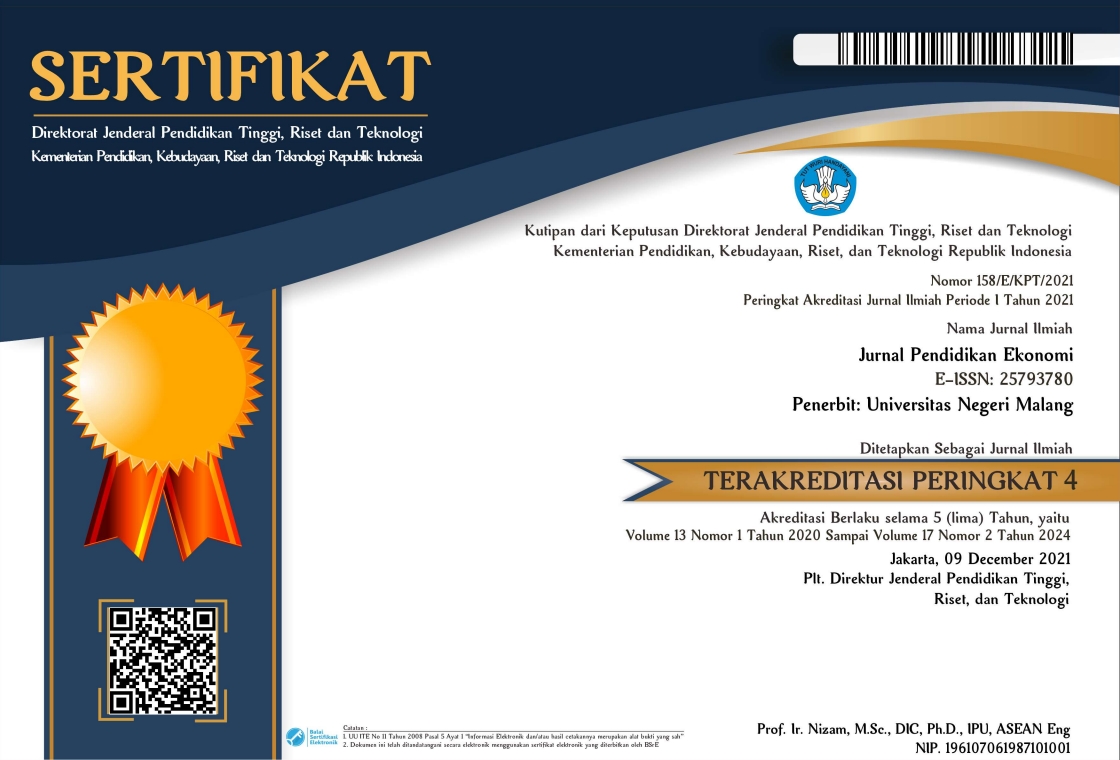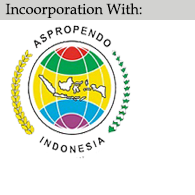Pengaruh Modernitas Individu dan Pemanfaatan Teknologi Informasi terhadap Minat Berwirausaha Generasi Z Pada Siswa SMA di Kota Malang
Abstract
Generation Z is a generation that has the potential to become successful entrepreneurs in the future. Generation Z, which is in the birth range from 1995-2010, has innovative ideas to create modern business opportunities. Self-confidence and the discovery of new things are elements of individual modernity that build Generation Z's interest in entrepreneurship. Generation Z who are recovering in the digitalization era can take advantage of information technology to start entrepreneurship. This study aims to find out how individual modernity and the use of information technology affect Generation Z's interest in entrepreneurship partially and simultaneously. 294 high school students in Malang City including SMAN 1 Malang, Brawijaya Smart School Malang High School, Panjura High School, and UM Laboratory High School who were the subjects of this study were given questionnaires using a quantitative descriptive research approach. The research findings reveal a significant positive effect, both partially and simultaneously on individual modernity variables (X1) and information technology utilization (X2) on the interest in entrepreneurship of Generation Z (Y). The results of this study indicate that acquisition, acceptance of new things, and self-confidence encourage Generation Z's interest in entrepreneurship. The use of information technology also encourages interest in entrepreneurship for Generation Z by looking for things related to entrepreneurship. Generation Z's interest in entrepreneurship will not just end up as a desire if there is awareness from within them to realize business opportunities in real life.
Keywords
Full Text:
PDFReferences
Ainley, M., Hidi, S., & Berndorff, D. (2002). Interest, learning, and the psychological processes that mediate their relationship. Journal of Educational Psychology, 94(3), 545–561. https://doi.org/10.1037/0022-0663.94.3.545
Antonucci, T. C., Ajrouch, K. J., & Manalel, J. A. (2018). Social Relations and Technology : Continuity , Context , and Change. The GERONTOLOGICAL Society of America, 1(3), 1–9. https://doi.org/10.1093/geroni/igx029
Ary, D., Jacobs, L. C., & Razavieh, A. (2002). Introduction to Research in Education (D. Alpers (ed.); 7th ed.). Wadsworth Group.
Aslan, S., Fastrich, G., Donnellan, E., Jones, D. J. W., & Murayama, K. (2021). People’s naïve belief about curiosity and interest: A qualitative study. PLoS ONE, 16(9 September), 1–20. https://doi.org/10.1371/journal.pone.0256632
Balachandran, V., & Sakthivelan, M. S. (2013). Impact Of Information Technology On Entrepreneurship. Journal of Business Management & Social Sciences Research (JBM&SSR), 2(2), 51–56. https://doi.org/ISSN No: 2319‐5614
Berkup, S. B. (2014). Working With Generations X And Y In Generation Z Period : Management Of Different Generations In Business Life. Mediterranean Journal of Social Sciences MCSER Publishing, 5(19), 218–229. https://doi.org/10.5901/mjss.2014.v5n19p218
Bhide, A. (1996). The questions every entrepreneur must answer. Harvard Business Review, 74(December), 120–130. http://search.ebscohost.com/login.aspx?direct=true&db=bth&AN=9611188008&site=eds-live
Creswell, J. W. (2011). Educational Research: Planning, Conducting, and Evaluating Quantitative and Qualitative Research (M. Buchholtz (ed.); 4th ed.). Pearson Production.
Dolot, A. (2018). The characteristics of Generation Z. E-Mentor, 2(October). https://doi.org/10.15219/em74.1351
Endres, A. M., & Woods, C. R. (2006). Modern Theories of Entrepreneurial Behavior : A Comparison and Appraisal. Springer-Verlag Berlin Heidelberg, 189–202. https://doi.org/10.1007/s11187-004-5608-7
Godwin, R. K. (2016). The Relationship between Scores on Individual Modernity Scales and Societal Modernization Author ( s ): R . Kenneth Godwin Source : The Journal of Developing Areas , Vol . 9 , No . 3 ( Apr ., 1975 ), pp . 415-432 Published by : College of Business , Tenne. The Journal of Developing Areas, 9(3), 415–432.
Gough, H. G. (2010). Further Validation of a Measure of Individual Modernity. Journal of Personality Assessment, January 2015, 37–41. https://doi.org/10.1207/s15327752jpa4101
Guzmán, C., Santos, F. J., & Barroso, M. de la O. (2020). Analysing the links between cooperative principles, entrepreneurial orientation and performance. Small Business Economics, 55(4), 1075–1089. https://doi.org/10.1007/s11187-019-00174-5
Hu, X., Chen, S. X., Zhang, L., Yu, F., Peng, K., & Liu, L. (2018). Do Chinese Traditional and Modern Cultures Affect Young Adults ’ Moral Priorities ? Frontiers in Psychology, 9(November), 1–7. https://doi.org/10.3389/fpsyg.2018.01799
Jeraj, M., & Aydin, G. (2021). Entrepreneurial Curiosity Among Generation Z : A Multi-Country Empirical. Advances in Business-Related Scientific Research Journal, 12.
Jones, P., Pickernell, D., Connolly, R., & Netana, C. (2017). A Tale of Two Universities : Graduates Perceived Value of Entrepreneurship Education. Education and Training, July. https://doi.org/10.1108/ET-06-2017-0079
Kurniawan, Khafid, & Pujiati. (2016). Motivasi Diri Terhadap Minat Berwirausaha Pada Mahasiswa Pendidikan Ekonomi Universitas Lampung Tahun 2018. Journal of Economic Education, 5(1), 100–109.
Liu, X., Lin, C., Zhao, G., & Zhao, D. (2019). Research on the Effects of Entrepreneurial Education and Entrepreneurial Self-Efficacy on College Students ’ Entrepreneurial Intention The Effect of Entrepreneurial Education. Frontiers in Psychology, 10(April), 1–9. https://doi.org/10.3389/fpsyg.2019.00869
Markey, A., & Loewenstein, G. (2014). Curiosity (pp. 228–243). Routledge.
McClelland, D. C. (1976). The Achieving Society (2nd ed.). Irvington Publisher Inc.
Nguyen, T. L., Gia, T., Le, T., Huynh, B. M., Kieu, T., Vo, T., Hai, P., & Ha, A. (2021). Factors Affecting Entrepreneurial Intention of Generation Z During COVID-19 Pandemic : An Empirical Study from Vietnam. Journal of Asian Finance, Economics and Business, 8(12), 443–453. https://doi.org/10.13106/jafeb.2021.vol8.no12.0443
Onn, C. W. (2013). Mini Literature Analysis on Information Technology Definition. International Institute for Science, Technology and Education (IISTE): E-Journals, 139–141.
Powers, A. (2018). Why Gen-Z Talent Is More Likely To Pursue Entrepreneurship. Forbes, 30–31.
Rod, V. Š. (2020). Nova Generacija Poduzetnika; Generajica Z. Obrazovanje Za Poduzetništvo, 10(1). https://doi.org/https://doi.org/10.38190/ope.10.1.3
Rovira, S. (2021). Digital Technologies For The Future. https://doi.org/S.20-00960
Tavakoli, A. (2013). Impact of Information Technology On the Entrepreneurship Development. Advances in Environmental Biology, 7(8), 1421–1426.
Thompson, R. L., Higgins, C. A., Howell, J. M., Thompson, B. R. L., Higgins, C. A., Na, C., & Howell, J. M. (1991). Personal Computing : Toward a Conceptual Model of Utilization. Management Information Systems Research Center, University of Minnesota, 15(1), 125–143. https://doi.org/http://www.jstor.org/stable/249443 . Accessed:
Tulgan, B. (2013). Meet Generation Z : The second generation within the giant " Millennial " cohort. RainmaketThingking.
Wardhana, A., & Sulaiman, S. (2022). Peran self-efficacy dalam meningkatkan minat berwirausaha women entrepreneur yang dimediasi oleh pengetahuan kewirausahaan. Jurnal Ekonomi Modernisasi, 18, 132–148.
Zenebe, A., Alsaaty, F. M., & Anyiwo, D. (2017). Relationship between individual ’ s entrepreneurship intention , and adoption and knowledge of information technology and its applications : an empirical study. Journal of Small Business & Entrepreneurship, 0(0), 1–18. https://doi.org/10.1080/08276331.2017.1397441
Zwan, P., Thurik, R., Verheul, I., & Hessels, J. (2016). of opportunity and necessity entrepreneurs. Eurasian Business Review. https://doi.org/10.1007/s40821-016-0065-1
DOI: http://dx.doi.org/10.17977/UM014v16i12023p022
Refbacks
- There are currently no refbacks.

Jurnal Penddidikan Ekonomi is licensed under a Creative Commons Attribution-NonCommercial-ShareAlike 4.0 International License





